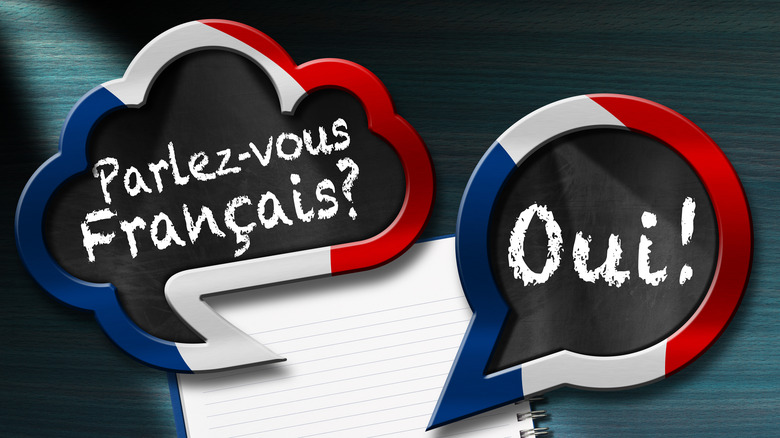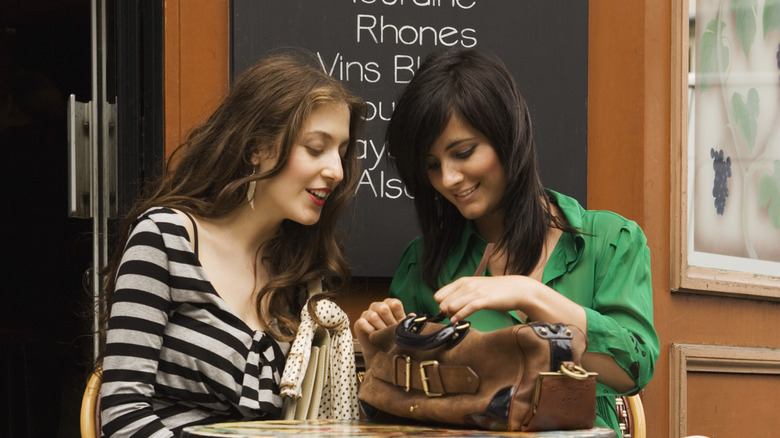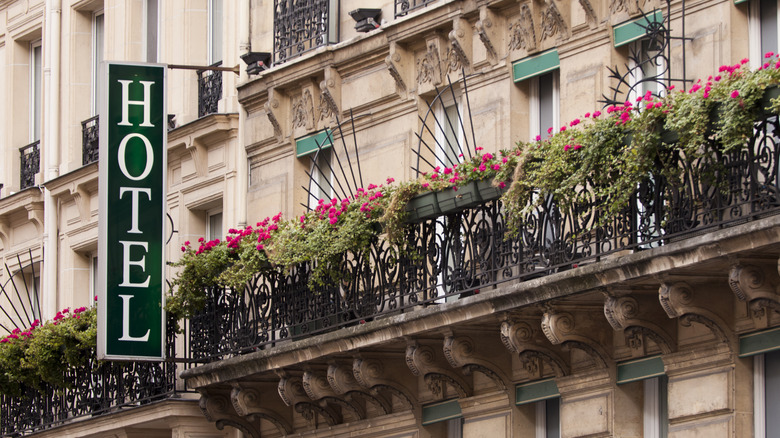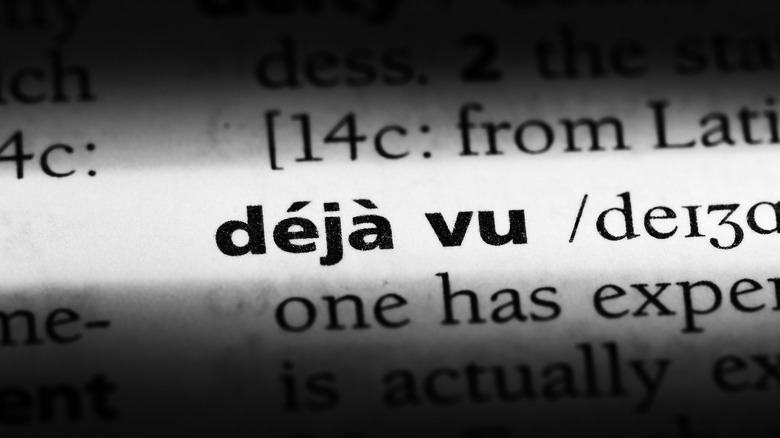Essential Words And Phrases To Know Before Your Trip To France
Whenever you travel somewhere that speaks a different language, it will heighten your experience to know at least a few words to use. While it's not totally necessary in many places in Europe and abroad, knowing a bit of the language makes you a better tourist and allows you to communicate with the people who live there. In France, many of the folks around you will be able to speak and understand English, but that doesn't mean you shouldn't try to converse with them in French when possible (the French do have a reputation of expecting tourists to at least try!).
All the same, there are some phrases you should know just to make life easier when you travel to France. These bits of French will come in handy when out and about and interacting with the city and the locals there. And even if the locals don't appreciate your efforts, you can walk away from this small language lesson with a bit more understanding of another language!
Greetings in French
Knowing how to say "hello" will serve you well no matter where you go. From greeting tour guides to bidding a fond pleasantry to the hotel staff or making friends along the way, "bonjour" (/ bohn-zhoor /) or "Hello" is an essential piece of French to know. Even if French folks are less forthcoming with saying anything to strangers than Americans, being able to at least say "hello" in a local language never hurts.
In the same vein as "bonjour," knowing how to say "goodbye" is also a vital language lesson. French for "goodbye" is "au revoir" (/ oh-rev-vwha /). You can also mix in a few other phrases to change up how you say "goodbye" if you feel like adding something to your French language skills. You can also say "à bientôt" to say "see you soon" or a simple "salut" for "bye" or a more informal way of saying "hi." The standard "au revoir" can always work in a pinch, especially if you're saying "goodbye" to someone you don't know very well.
Variations of yes
There's a good chance you already know the word "oui" (/ we /) or "yes" in French. Just as words like "petite" or "fiancé," English speakers know quite a few words in French whether they try to learn the language or not. "Oui" is a simple affirmative word that takes no practice to perfect. Whether you're agreeing to a cafe order or confirming your name for a reservation, "oui" is the easiest way to say "yes", especially in casual conversations or interactions.
Should you feel like adding to your vocabulary, there are other ways to agree or affirm something. Whether you say "absolument" for "absolutely" or "bien sûr" for "of course," you can swap in either for more assured "yes" situations. You'll likely hear both in your interactions in France, especially between friends. Don't be afraid to try some different versions of "yes" while you're on your trip, even if you're shy about your accent or pronunciation. Practice makes perfect, oui?
Variations of no
Not to be pronounced like "none" or "non," the French word for a simple "no" is not much different from its English counterpart. A standard "no" in French is "non" (/ noh /). Even saying "non" with the English pronunciation will not be a language barrier during your travels, though trying to pronounce it the French way is the best way to fit in.
If you want to be more polite than just saying a short "no" you can say "no thank you" by saying "non merci." This is particularly good if you're being offered more food or asked if you need anything at a shop as it's the most courteous way you can decline something. Should you want to be more elaborate in your "no thank you," you can also say "non merci, c'est tout" for "no thanks, that's all." This phrase can help if you are encountering a pushy salesperson or an insistent server to show that you are firm in your "no."
How to be polite in French
Fans of Miss Piggy will know this phrase, "excusez-moi" (/ ex-koo-say mwa /) or "excuse me" from the many times she says it in "The Muppets." Being able to excuse yourself from a variety of situations in France is an excellent phrase to remember. "Excusez-moi" is a pretty easy phrase to keep handy during your travels, especially when navigating through crowds or trying to get someone's attention.
Anytime you travel somewhere where you don't speak the language, one of the most important things you can learn to say is "please." In French that would be "s'il vous plaît" (/ seel-voo-play /). No one likes a rude tourist no matter where you are in the world. Americans have a tendency to be overly polite when traveling (especially with strangers) but you're going to want to remember to say "s'il vous plait" when interacting with folks.
So "pas de quoi" (/ Pah-de-kwah /) is not the most common way to say "you're welcome" in French, but it is a great common phrase to know for your trip. It's an overtly casual way of saying "you're welcome" or "don't mention it" and can be used informally during your interactions. You'll most likely hear "de rien" as "you're welcome," which is mostly used with people you have a relationship with already. It can be rude to say "de rien" in formal occasions or with older folks.
Ways to say thank you in French
"Merci" (/ mare-see /) on its own means "thank you" in French, though there are a lot of variations of the phrase you can consider using during your trip. A simple "merci" will often work to convey your gratitude, though it can be fun to mix it up for different situations or to practice your skills. Different ways to say "thank you" in French essentially mean tacking other words onto "merci."
Unlike other French words or phrases, the majority of the "thank you" variations are appropriate for any occasion or audience. "Merci beaucoup" is easy to remember and translates to "many thanks" to show more gratitude while "merci bien" means "thank you very much." Be careful with "merci bien" though, because it can sometimes be perceived as sarcastic which is probably not how you're intending to use it. So, if you don't speak very much French, it can be hard to explain that you aren't being sarcastic, so just be mindful of your tone.
How to explain your language skills
There is nothing wrong with admitting that you don't understand something, especially if you aren't fluent in the local language. So in instances where you don't know what's being said, you can say "je ne comprends pas" (/ Zhe ne cohmp-ron pas /) or "I don't understand." Before you ask if the person speaking speaks your language, try explaining that you don't understand. It's possible you'll understand if the speaker repeats themselves or rephrases what they said.
If you understood part of what someone said, you could say "I don't understand everything" by saying "je ne comprends pas tout." That way, the person speaking knows you understood some of what they said. Or you could simply say "comment?" for a simple "what?" signaling that you didn't understand what was said.
When trying to converse, especially with limited language skills, you may need to ask someone to repeat themselves. When that happens, you'll want this polite phrase to ask someone kindly to repeat what they just said: "pourriez-vous répéter, s'il vous plait?" (/ puri-ay voo reh-peh-tay, seel voo play? /) This can be a tricky phrase to remember, though it is better to be able to ask it politely. If you can't remember the whole phrase, at least remember "répéter, s'il vous plait" which means "repeat, pleases" or "repeat it please."
How to explain you don't speak French
At a certain point, you may have to just admit that you don't speak French. In that case you can say "Je ne parle pas français" (/ Zhe ne parl pah frahn-say /) or "I don't speak French." If you speak a little French you can say "je ne parle pas très bien français" to say "I don't speak French very well." Admitting that you don't speak much French is a better way to bridge the language barrier before immediately asking if the other person speaks English.
If all else fails, you can still ask if the person you're speaking to can speak in English: "Parlez-vous anglais?" (/ par-lay voo ahn-glay /). This is the phrase that may get you the most ire in trying to speak to locals. Try your best not to jump right into asking if someone speaks English if you are trying to speak French during your trip. Being able to at least ask "parlez-vous anglais?" is more than most tourists will do, but it can be offensive to immediately ask everyone if they speak English. It isn't the locals' job to meet tourists' language expectations.
It can also help the situation if you say "je suis désolé, tu parles anglais?" which means "I'm sorry, do you speak English?" Sometimes there's no helping the situation if you are up against a language barrier, but a quick apology can lighten the mood.
Phrases in French for directions
A few general words to remember for asking for directions include "où?" ( / Oo ? /) to just say "where?" Or if you need to say "where is?" you can say "où est... ?" (/ oo eh /). If you don't know the word for something you could say "où est" and say the name of the location in English. Even if you don't say the French "tour Eiffel," everyone will know that you want to see the Eiffel Tower.
When you're out and about, keep an eye out for signs for toilettes or WC (water closet). You won't see signs for a bathroom, so try to get that word out of your vocabulary before traveling. If you need help finding them you can say "où sont les toilettes?" (/ oo son les twa-let? /) or "where are the toilets?" There's a chance if you ask someone for a "bathroom" in English they will think you want a place to bathe and not a toilet.
Of similar importance, train stations are a place you'll likely find yourself throughout your journey. Train transportation is one of the best ways to see Europe, as they are so plentiful. That's especially true in France – unless you can't find the station. If that happens, you'll want to know the phrase "où est la gare?" (/ oo eh la gahr? /) or "where is the train station?" Don't rely solely on your phone's GPS when traveling in France, sometimes it's just easier to ask for directions.
Phrases for shopping in French
Two of the most important words for shopping anywhere have to do with whether the place is open for business. In French, "open" is "ouvert" ( / oo-vehr /) and "closed" is "fermé" (/ fair-may /). If you forget the easy thing to remember is that the word for "open" also starts with an "o." Keep in mind that a lot of shops will be closed on Sundays and holidays, so just be aware of what's going on around you.
Another important phrase for shoppers is the ever-important "how much is it?" In French that would be "combien ça coûte?" (/ Cohm-by-en sah coot /). When paying by card remember to opt for paying in the local currency as it results in fewer bank charges on your end. Though some places may be cash only, so double-check before you fall in love with something at the store!
If you want the shopkeeper to know that they're offering you a good deal on something you could tell them so by saying "bon marché" or "inexpensive." Otherwise, you could say that they're giving you a good deal by saying "une bonne affaire." But do be careful if you say that something is unique or "c'est original" because it can easily be taken as a snarky comment instead.
Phrases for eating in restaurants
Obviously one of the best things you can do in France besides indulging in all of the histories is indulging in the famous food. This can be one of the trickiest situations for newbie French speakers because a misspoken order could end up in receiving something entirely different. Not to worry though, restaurant staff can usually spot English speakers and will give you an English menu to avoid any accidental orders.
First and foremost, do not call the waitstaff "garçon," which means "boy"because it is considered insulting. If you want to get your waiter's attention, you can say "monsieur" (/ m'syhur /) or "madame" (/ mah-dam /) to address them instead. Like "oui," these words are probably familiar to you. If you do not want to dictate the waitstaff's gender identity, you can also get their attention by simply saying "excuse me" or "excusez-moi" instead.
A few simple ways to say the different varieties of dishes to order include "l'entrée" for the "starter" or "appetizer," "le plat principal" for "main dish" and an especially simple "le dessert" for "dessert." Also, keep in mind that a bread basket isn't necessarily free or placed there as an appetizer. At the end of your meal, politely ask for the bill by saying "l'addition s'il vous plait."
Phrases for a hotel
Travelers can do so much of their hotel booking and customer experience online, that knowing how to ask for a room isn't really necessary anymore. Still, there are a few phrases that are good to know, especially if something goes awry. Being able to tell the front desk that something is wrong with your bill or "the bill is incorrect" by saying "l'addition n'est pas correcte" is always good to know. Also, try to remember "je voudrais un reçu" or "I'd like a receipt," especially if you need to itemize your trip for work.
One especially helpful thing a hotel can arrange even in the age of rideshare apps is a taxi ride. Asking for a taxi is fairly simple, especially since the word "taxi" stays the same. "Je voudrais un taxi," for "I would like a taxi," is the most straightforward way to ask the hotel to request a ride for you. They can also recommend the best apps to request your own ride if you prefer. Uber may be international but its coverage isn't always great outside major metropolitan areas.
A few more words to remember just in case you need to request something from the front desk include: "l'oreiller" for "pillow," "la serviette" for "towel" and "un climatiseur" for "air conditioner." Keep in mind that not all hotels are going to have air conditioning. So if you are going to France in the summer and need a/c, double check the hotel has it when booking online.
Phrases you may already know
There are a lot of French words that have become part of English vocabulary all over the world whether we intentionally say them or not. While you're in France, don't be surprised if you find yourself bringing these words into your regular vernacular. One common French phrase in English is "je ne sais quoi" to say something or someone has a certain quality or "I don't know what." While not the most common thing you could say on a day-to-day basis, it's certainly something worth uttering at least once in France.
Another easy go-to French expression is "voilá" to say "there it is!" While this is more of an exuberant exclamation than anything else, it's an easy word to remember if you're looking for something and finally find it while in France. In the same way the French word "petite" for "small" or "short" may also come in handy while you're visiting the country.












